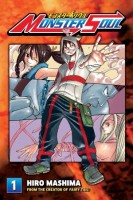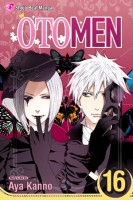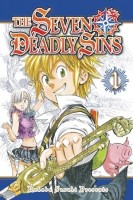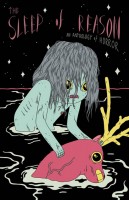My News and Reviews
Three posts last week! The first was the announcement of the Oi, Oishinbo! manga giveaway winner, which also includes a list of some of the food manga that has been licensed in English. And speaking of food manga, last week I reviewed Fumi Yoshinaga’s What Did You Eat Yesterday?, Volume 2. I’m really enjoying the series and am thrilled that it’s being released in English. I also reviewed Blade of the Immortal, Volume 29: Beyond Good and Evil by Hiroaki Samura, which is pretty much the beginning of the end of the series. I love Blade of the Immortal, so I’m interested to see how Samura will wrap everything up and who, if anyone, will survive its conclusion.
Things have been a bit hectic in my life lately, so I’ve not been able to pay attention to all of the news and announcements recently, but I did catch a few things on Vertical’s Twitter account. Apparently, its warehouse is down to the last 24 copies of Message to Adolf, Part 1 and it may or may not be reprinted. So, if you want a copy, you should probably grab it sooner rather than later. Adolf was my introduction to Osamu Tezuka, and it remains one of my favorite works by him. Also, Vertical was at AnimeNEXT and made a new license announcement—Dream Fossil: The Complete Short Stories of Satoshi Kon. Though it wasn’t perfect, I enjoyed Kon’s Tropic of the Sea a great deal, so am looking forward to this collection as well as the other Kon manga announced by Dark Horse a couple of months ago.
Quick Takes
 Monster Soul, Volume 1 by Hiro Mashima. For readers intimidated by the length of Fairy Tail or Rave Master, Mashima’s two-volume Monster Soul sets a much lower bar for entry to his work. During the Human-Monster War, the Black Airs were an elite group of exceptionally powerful monsters. Now that the war is over, and the monsters have lost, they mostly try to keep to themselves. But with human poachers, a ghost with an agenda, and another monster picking a fight, trouble seems to find them anyway. Monster Soul is somewhat episodic, but Mashima does seem to be developing some sort of underlying plot. Since the series is only two volumes long though, it probably can’t be particularly convoluted or in-depth. That being said, I’m not entirely sure what direction Monster Soul will be taking. The story moves along very quickly, there are numerous fights, and the characters are boisterous. I wasn’t blown away, but the first volume of Monster Soul could be entertaining.
Monster Soul, Volume 1 by Hiro Mashima. For readers intimidated by the length of Fairy Tail or Rave Master, Mashima’s two-volume Monster Soul sets a much lower bar for entry to his work. During the Human-Monster War, the Black Airs were an elite group of exceptionally powerful monsters. Now that the war is over, and the monsters have lost, they mostly try to keep to themselves. But with human poachers, a ghost with an agenda, and another monster picking a fight, trouble seems to find them anyway. Monster Soul is somewhat episodic, but Mashima does seem to be developing some sort of underlying plot. Since the series is only two volumes long though, it probably can’t be particularly convoluted or in-depth. That being said, I’m not entirely sure what direction Monster Soul will be taking. The story moves along very quickly, there are numerous fights, and the characters are boisterous. I wasn’t blown away, but the first volume of Monster Soul could be entertaining.
 Otomen, Volumes 16-18 by Aya Kanno. I’m not sure that Otomen really needed to be eighteen volumes long, but I enjoyed every volume of it. The series just makes me so incredibly happy. It can be ridiculous and eyeroll-worthy at times, usually deliberately so, but I love it. The characters, while they don’t have much depth, are incredibly endearing. Kanno plays around with gender roles and expectations in Otomen, that’s one of the major points of the series, but never in a denigrating way. The not-so-subtle message of Otomen is that it is just fine to be whoever it is you are. These final three volumes find Asuka and many of the others in their last year of high school. They begin drifting apart for various reasons, the biggest being the influence of Asuka’s mother, and it is heartbreaking to see. Kanno has never hesitated to make use of well-worn tropes and plot developments in Otomen–frequently the series verges on parody because of that–but I was a little unsure about the memory loss arc. Ultimately though, the series ends in a very satisfying way.
Otomen, Volumes 16-18 by Aya Kanno. I’m not sure that Otomen really needed to be eighteen volumes long, but I enjoyed every volume of it. The series just makes me so incredibly happy. It can be ridiculous and eyeroll-worthy at times, usually deliberately so, but I love it. The characters, while they don’t have much depth, are incredibly endearing. Kanno plays around with gender roles and expectations in Otomen, that’s one of the major points of the series, but never in a denigrating way. The not-so-subtle message of Otomen is that it is just fine to be whoever it is you are. These final three volumes find Asuka and many of the others in their last year of high school. They begin drifting apart for various reasons, the biggest being the influence of Asuka’s mother, and it is heartbreaking to see. Kanno has never hesitated to make use of well-worn tropes and plot developments in Otomen–frequently the series verges on parody because of that–but I was a little unsure about the memory loss arc. Ultimately though, the series ends in a very satisfying way.
 The Seven Deadly Sins, Volumes 1-2 by Nakaba Suzuki. Back in my undergrad days I took a fantastic course that focused on the use and portrayal of the seven deadly sins in music and literature, and so Suzuki’s The Seven Deadly Sins manga immediately caught my attention. At first, I was a little uncertain about The Seven Deadly Sins. It took a few chapters to really grow on me, and when present Meliodas’ lecherous tendencies still seem more like a tired cliché rather than any sort of legitimate character development, but the series has great potential. The Seven Deadly Sins are a group of extremely talented warriors who may be the only ones capable of stopping the Holy Knights from destroying Britannia. It isn’t yet known why the group goes by “The Seven Deadly Sins,” or what sins the members have committed to earn their monikers, but I’m assuming that will be revealed sometime in the future. The Holy Knights are the ones being framed as the series’ villains, but the Sins aren’t entirely good, either, which I appreciate. With interesting characters and epic battles, I’m looking forward to reading more.
The Seven Deadly Sins, Volumes 1-2 by Nakaba Suzuki. Back in my undergrad days I took a fantastic course that focused on the use and portrayal of the seven deadly sins in music and literature, and so Suzuki’s The Seven Deadly Sins manga immediately caught my attention. At first, I was a little uncertain about The Seven Deadly Sins. It took a few chapters to really grow on me, and when present Meliodas’ lecherous tendencies still seem more like a tired cliché rather than any sort of legitimate character development, but the series has great potential. The Seven Deadly Sins are a group of extremely talented warriors who may be the only ones capable of stopping the Holy Knights from destroying Britannia. It isn’t yet known why the group goes by “The Seven Deadly Sins,” or what sins the members have committed to earn their monikers, but I’m assuming that will be revealed sometime in the future. The Holy Knights are the ones being framed as the series’ villains, but the Sins aren’t entirely good, either, which I appreciate. With interesting characters and epic battles, I’m looking forward to reading more.
 The Sleep of Reason: An Anthology of Horror edited by C. Spike Trotman. Edited by the same person who has been coordinating the new Smut Peddler anthologies, The Sleep of Reason collects twenty-six short horror comics. Some of the creators (like Jason Thompson and Carla Speed McNeil, among others) I was already familiar with, but there were plenty of other contributors whose work I was encountering for the very first time. That’s one of the things I love about anthologies like The Sleep of Reason–they introduce me to new artists that I want to follow. I also love being exposed to so many different styles of art and storytelling. There is some blood, death, and gore in The Sleep of Reason, but the collection isn’t a splatter fest and relies much more heavily on the psychological aspects of horror rather than on violence. As with any anthology, some of the stories are stronger than others. I’m not sure that I even completely understood some of them, but they all were eerie, disconcerting, and creepy. The Sleep of Reason is a great collection; definitely recommended for fans of horror.
The Sleep of Reason: An Anthology of Horror edited by C. Spike Trotman. Edited by the same person who has been coordinating the new Smut Peddler anthologies, The Sleep of Reason collects twenty-six short horror comics. Some of the creators (like Jason Thompson and Carla Speed McNeil, among others) I was already familiar with, but there were plenty of other contributors whose work I was encountering for the very first time. That’s one of the things I love about anthologies like The Sleep of Reason–they introduce me to new artists that I want to follow. I also love being exposed to so many different styles of art and storytelling. There is some blood, death, and gore in The Sleep of Reason, but the collection isn’t a splatter fest and relies much more heavily on the psychological aspects of horror rather than on violence. As with any anthology, some of the stories are stronger than others. I’m not sure that I even completely understood some of them, but they all were eerie, disconcerting, and creepy. The Sleep of Reason is a great collection; definitely recommended for fans of horror.

















 1. Bleach | Tite Kubo | Viz Media – At this point, I suppose I know more fans who have stopped reading Tite Kubo’s shounen battle epic than those who have kept on, but for my part, I’m actually a little surprised. While it’s absolutely true that I tend to find its long battle sequences tragically uninteresting, the point at which I dropped the series (after
1. Bleach | Tite Kubo | Viz Media – At this point, I suppose I know more fans who have stopped reading Tite Kubo’s shounen battle epic than those who have kept on, but for my part, I’m actually a little surprised. While it’s absolutely true that I tend to find its long battle sequences tragically uninteresting, the point at which I dropped the series (after  2. Otomen | Aya Kanno | Viz Media – Otomen is a series that has left me tormented. On one hand, it’s absolutely brilliant. I mean really, truly, a gorgeous piece of work. But much like one of Kate’s drop-ees, Detroit Metal City, a person could die waiting for something to actually happen. These series are like old-school television sitcoms. Though at any moment it might seem like something significant could happen, changing its characters’ lives in truly dramatic ways, everything is back to normal by the end of the episode, with everyone safely returned to exactly where they started. As brilliant as the series’ premise is, it’s failed for me as long-form storytelling, and unless there’s going to be some genuine forward motion in plot or characterization, I’m loathe to give it more of my time.
2. Otomen | Aya Kanno | Viz Media – Otomen is a series that has left me tormented. On one hand, it’s absolutely brilliant. I mean really, truly, a gorgeous piece of work. But much like one of Kate’s drop-ees, Detroit Metal City, a person could die waiting for something to actually happen. These series are like old-school television sitcoms. Though at any moment it might seem like something significant could happen, changing its characters’ lives in truly dramatic ways, everything is back to normal by the end of the episode, with everyone safely returned to exactly where they started. As brilliant as the series’ premise is, it’s failed for me as long-form storytelling, and unless there’s going to be some genuine forward motion in plot or characterization, I’m loathe to give it more of my time.  3. Pluto | Naoki Urasawa/Osamu Tezuka | Viz Media – This dropped series is the saddest of them all, because I had no intention of dropping it at all. And though I understand how it happened, I’m not sure how to get back on track. Back in July of 2009, I wrote an entry called
3. Pluto | Naoki Urasawa/Osamu Tezuka | Viz Media – This dropped series is the saddest of them all, because I had no intention of dropping it at all. And though I understand how it happened, I’m not sure how to get back on track. Back in July of 2009, I wrote an entry called 





